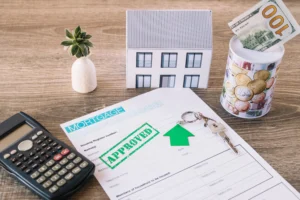Latest Facts and News
- Georgia’s tax lien market remains active in 2024, with monthly auctions across 159 counties.
- The interest rate for Georgia tax liens is currently 20%, making it an attractive investment option.
- Recent changes in Georgia law have streamlined the tax lien purchase process, making it more accessible to investors.
- The COVID-19 pandemic has led to an increase in tax-delinquent properties, potentially creating more investment opportunities.
- Georgia’s real estate market continues to grow, potentially increasing the value of tax lien investments.
Are you looking for a smart investment option in the real estate world? You should consider buying a tax lien property in Georgia.
A tax lien property is when a property owner doesn’t pay taxes on their property, and then the county auctions tax deeds on that property. From these properties, investors get a chance to get high returns or even get the property at half the market value.
To better understand this process, it is important to consider the potential risks involved and how to navigate the acquisition of tax lien properties in Georgia.
Step by step, we are going to assist you in understanding everything you need to know. This guide will help you maximize your investment opportunities in Georgia tax liens.
Understanding Tax Liens in Georgia
A tax lien is basically a legal claim the government puts on a property. If a property owner doesn’t pay their taxes, this lien helps the government get back the unpaid taxes by having a claim on that property.
In Georgia, failing to pay taxes gives an investor the right to purchase a redeemable tax deed. However, unlike other states where tax lien buyers get immediate ownership, Georgia’s tax lien system allows the original titleholder a waiting period where they can clear their dues and reclaim the property. Until this period ends, the buyer does not fully own the property.
The Georgia Tax Lien Process
In Georgia, when property taxes go unpaid, the county follows a legal process that can eventually make the property available for tax lien purchase. Here’s how it works:
- Tax Delinquency: If the titleholder does not pay the liability within the stipulated time, the county tax commissioner sends a tax delinquency notice to the owner.
- Notice of Sale: If the liability is still unpaid, the county proceeds to auction the property and does a tax sale. The action is further publicized through the local newspaper, informing the public that the asset would be auctioned off.
- Public Auction: Investors have the opportunity to compete against each other and purchase the tax deeds of these specific properties during set dates for the auction.
- Winning Bid: The winner gets a tax deed to the property but does not gain full ownership.
- Redemption Period: The original owner has a redemption period of one year to pay the amount paid at the tax sale, adding a 20% penalty.
- Foreclosure: If the property is not redeemed in one year, the buyer can go for the foreclosure process to get complete ownership of the property.
How to Buy Tax Lien Properties in Georgia: Step-by-Step Guide
If you have the right knowledge and know the right steps, real estate investing in Georgia can be very beneficial. Here is a step-by-step guide on how to buy tax lien properties in Georgia.
Researching Available Properties
- Identify Counties of Interest: Start by researching and finding the counties in Georgia where you want to invest. Each county has its own tax sales.
- Access County Tax Commissioner Websites: After finalizing the counties, visit their official website. Many have a list of tax-delinquent properties on their website for auction. They also advertise auctions in local newspapers.
- Review Property Details: See the information mentioned about the property, like location, the amount of taxes they owe, parcel number, etc.
- Conduct Due Diligence: Research the market value of the property for a better investment. Check for any existing liens that can affect the property’s value and your investments. Visit the property if possible to see its condition.
Registering for Tax Lien Auctions
- Understand Auction Schedules: Different counties can have different auction schedules, so it is important to confirm dates with the county.
- Registration Requirements: Some counties require you to preregister before participating in the auction. You need to fill out a registration form and provide identification. Some might also require you to give a deposit before bidding.
- Online Registration Options: Many counties also give you an option for online registration; check carefully before proceeding.
Bidding Strategies for Georgia Tax Lien Auctions
- Set a Budget: Set your budget based on your market research and capacity.
- Understand Bidding Procedures: Auctions usually start with a starting bid that involves unpaid taxes, interest, and administrative costs.
- Competitive Bidding Tips: Don’t let yourself get caught up in bidding wars and pay more. Observe other bidders if you are new before taking any actions. Also, try to build relationships with pro investors for more industry knowledge
- Post-Auction Procedures: Once you have won the bidding process, ensure you make the initial payment to the county and receive all the necessary documentation, such as a tax lien certificate for verification purposes.
The Redemption Period and Property Ownership
In Georgia, people have the right to redeem a property even after it has been set to a tax sale. The timeframe within which the property can be reclaimed is referred to as the redemption period.
Length of Redemption Period
The redemption timeframe for such a property is twelve months from the date it was put up for auction. During this time, owners get the right to reclaim ownership by paying the auction cost plus an additional payment to cover the set penalty fee. This gives the homeowner a chance to get their property back.
How Does Redemption Work?
To get the property back, the owner has to pay:
- The amount that was paid at the tax sale.
- The amount that the buyer has paid after the sale in terms of taxes or special assessments.
- A 20% penalty on the amount paid at the tax sale for the first year.
- An additional 10% for each year or fraction of a year after the first year.
| Example: If the property is sold for $10,000 in a tax sale, and if the original owner gets it back within the first year, they have to pay: Initial Amount: $10,000 20% Premium: $2,000 Total Redemption Cost: $12,000 If the owner redeems the property after one year, an additional 10% will be added, making the total premium 30%, and the total redemption cost comes to $13,000. |
Outcomes After the Redemption Period
- When a tax lien property is redeemed, the original owner gets full ownership over the said property after paying the set fee.
- When a tax lien property is redeemed, after the redemption period, the original owner loses the right to the property, and the title can be changed to the new owner. At this point, the new owner can go for foreclosure to terminate the rights of the original owner over the property.
Risks and Rewards of Buying Tax Lien Properties in Georgia
While every investment comes with risks and rewards, purchasing a tax lien property can be very profitable. Take a look at this risk vs. reward analysis before investing to understand the advantages and disadvantages better.
Rewards of Buying Tax Lien Property in Georgia
- High interest rates on unpaid taxes can lead to significant returns (up to 20% annually)
- Potential for property acquisition if the owner fails to redeem
- Lower competition compared to traditional real estate markets
- Ability to earn interest while waiting for redemption
- Opportunity to purchase properties below market value
Risk of Buying Tax Lien Property in Georgia
- Property condition may be unknown, leading to unexpected repair costs
- Market fluctuations can negatively affect property values
- Complex foreclosure process if the owner does not redeem
- Potential for additional liens on the property, complicating ownership
- Risk of investing in properties with environmental issues that could incur costly remediation
Legal Considerations for Tax Lien Investors in Georgia
Investing in and obtaining a tax lien property also have some legal complexities. If you are an investor, you need to understand key legal aspects like foreclosure procedures and title issues. Let’s take a closer look at both of these:
Foreclosure Procedures
- Redemption Period: Investors have to wait for the redemption period to elapse after they buy a tax-lien property. The original holder has the option to redeem the asset by paying the total amount along with a 20% penalty in the first year which increases by 10% every subsequent year.
- Initiating Foreclosure: If the property has not been claimed in a year, foreclosure can start. Within Georgia, foreclosure generally runs “nonjudicial” and does not need any involvement of a court unless there happen to be other issues. Investors need to give notice 30 days prior to foreclosure.
- Quieting Title: After the foreclosure, investors need to start the quiet title process, which is an additional legal process that establishes ownership in order to secure their property rights.
Title Issues
- Existing Liens: Some properties may undergo the quiet title process, but other liens like mortgages or HOA (Homeowners Association) dues do not get cleared through foreclosure. Conduct thorough title research before purchasing to avoid unexpected liabilities.
- Public Record: Tax liens are public records, and any unresolved issues can make it difficult to sell the property later.
- Legal Claims Post-Foreclosure: Even after foreclosure, previous owners may challenge ownership or claim rights to the property. Having a legal adviser can help investors handle these situations effectively.
Make Informed Tax Lien Investment Decisions with Bowes and Sullivan Tax Group
Georgia’s real estate market offers numerous opportunities for investors. But before you dive in, it’s really important to get a good grasp of how to buy tax lien properties in Georgia. You should understand the potential risks, rewards, and legalities involved. Every step matters, from researching properties to handling foreclosure.
As we know, tax lien property can be profitable, but only when you have someone who knows how to do it with all the necessary expertise. That’s where Bowes and Sullivan Tax Group comes in. With decades of experience in Georgia tax law and property disputes, we help you assess the risks, interpret tax sale notices, and protect your investment throughout the entire process, from research to redemption to possible foreclosure.
Don’t take chances with your money, schedule a consultation and move forward with clarity and legal confidence.
Reach out now to speak directly with a tax attorney who understands Georgia’s tax lien system inside and out.
Frequently Asked Questions
What is the minimum investment required to buy tax lien properties in Georgia?
In Georgia, there is no minimum limit to invest in tax lien properties. The investment criteria are based on unpaid taxes, penalties, and property fees. Depending on the county, some properties start at a few hundred dollars, and others can go up to thousands.
Can non-residents of Georgia participate in tax lien auctions?
Yes, non-residents can participate in public tax lien auctions held in the state of Georgia. Residency is not required but you should register with the county holding the auction. You have to provide them with your identification, follow the rules, and complete the requirements for participation.
How long does the entire process of buying a tax lien property in Georgia typically take?
Typically, it depends on whether the property owner is willing to redeem the lien. After the property is sold to the investor at auction, the original owner has one year to pay the investor with interest to redeem it. If the property is not redeemed after this timeframe, the investor may commence the foreclosure process, which may last several months, so this entire procedure may take one to two years to complete.
What happens if multiple investors bid the same amount on a tax lien property?
Properties are sold to the person with the highest bid. Where two or more investors make the same bids, the auctioneer shall randomize the selection of the winning bid, either by drawing lots or on a first-come, first-served basis; it differs from county to county.
Are there any restrictions on the types of properties available for tax lien purchase in Georgia?
Some properties, like those owned by the government, properties having lawsuits, and properties under bankruptcy protection, may not be eligible. You should check property records and conduct due diligence before investing. And if this feels like too much, contact us; we can even help you understand the restrictions.







